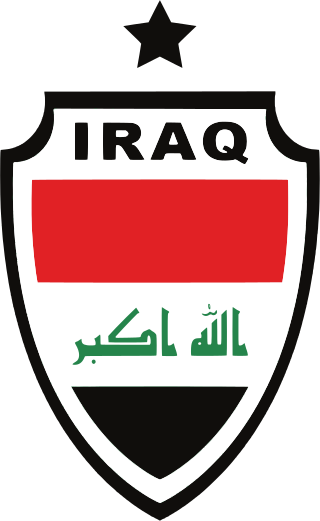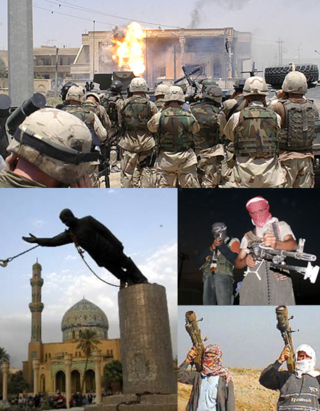Related Research Articles

The Iran–Iraq War was an armed conflict between Iran and Iraq that lasted from September 1980 to August 1988. It began with the Iraqi invasion of Iran and lasted for almost eight years, until the acceptance of United Nations Security Council Resolution 598 by both sides. Iraq's primary rationale for the attack against Iran cited the need to prevent Ruhollah Khomeini—who had spearheaded Iran's Islamic Revolution in 1979—from exporting the new Iranian ideology to Iraq; there were also fears among the Iraqi leadership of Saddam Hussein that Iran, a theocratic state with a population predominantly composed of Shia Muslims, would exploit sectarian tensions in Iraq by rallying Iraq's Shia majority against the Baʽathist government, which was officially secular and dominated by Sunni Muslims. Iraq also wished to replace Iran as the power player in the Persian Gulf, which was not seen as an achievable objective prior to the Islamic Revolution because of Pahlavi Iran's economic and military superiority as well as its close relationships with the United States and Israel.

Saddam Hussein was an Iraqi politician and revolutionary who was the fifth president of Iraq, from 16 July 1979 until 9 April 2003. He also served as prime minister of Iraq, first from 16 July 1979 until 23 March 1991, and later from 29 May 1994 to 9 April 2003. He was a leading member of the revolutionary Arab Socialist Ba'ath Party, and later, the Baghdad-based Ba'ath Party and its regional organization, the Iraqi Ba'ath Party, which espoused Ba'athism, a mix of Arab nationalism and Arab socialism.

The Gulf War was a 1990–1991 armed campaign waged by a 39-country military coalition in response to the Iraqi invasion of Kuwait. Spearheaded by the United States, the coalition's efforts against Iraq were carried out in two key phases: Operation Desert Shield, which marked the military buildup from August 1990 to January 1991; and Operation Desert Storm, which began with the aerial bombing campaign against Iraq on 17 January 1991 and came to a close with the American-led Liberation of Kuwait on 28 February 1991.

The 2003 invasion of Iraq was a United States-led invasion of the Republic of Iraq and the first stage of the Iraq War. The invasion phase began on 19 March 2003 (air) and 20 March 2003 (ground) and lasted just over one month, including 26 days of major combat operations, in which a combined force of troops from the United States, the United Kingdom, Australia and Poland invaded Iraq. Twenty-two days after the first day of the invasion, the capital city of Baghdad was captured by Coalition forces on 9 April 2003 after the six-day-long Battle of Baghdad. This early stage of the war formally ended on 1 May 2003 when U.S. President George W. Bush declared the "end of major combat operations" in his Mission Accomplished speech, after which the Coalition Provisional Authority (CPA) was established as the first of several successive transitional governments leading up to the first Iraqi parliamentary election in January 2005. U.S. military forces later remained in Iraq until the withdrawal in 2011.

During the 2003 invasion of Iraq by a United States–led coalition, the U.S. Defense Intelligence Agency developed a set of playing cards to help troops identify the most-wanted members of President Saddam Hussein's government, mostly high-ranking members of the Iraqi Regional Branch of the Arab Socialist Ba'ath Party or members of the Revolutionary Command Council; among them were some of Hussein's family members. The cards were officially named the "personality identification playing cards". As of 2021, all but four of the 52 most wanted have died or been either killed or captured, eleven of whom have been released.

The Iraq national football team represents Iraq in international football and is controlled by the Iraq Football Association (IFA), the governing body for football in Iraq. Iraq's usual home venue is the Basra International Stadium.

The Iraqi Premier Football League, or simply the Iraqi Premier League, is the top level of the Iraqi football league system. Contested by 20 clubs, it is operated by the Iraq Football Association (IFA) and operates on a system of promotion and relegation with the Iraq Division One.

The Iraq War was a protracted armed conflict in Iraq from 2003 to 2011 that began with the invasion of Iraq by the United States-led coalition that overthrew the Iraqi government of Saddam Hussein. The conflict continued for much of the next decade as an insurgency emerged to oppose the coalition forces and the post-invasion Iraqi government. US troops were officially withdrawn in 2011. The United States became re-involved in 2014 at the head of a new coalition, and the insurgency and many dimensions of the armed conflict are ongoing. The invasion occurred as part of the George W. Bush administration's war on terror following the September 11 attacks, despite no connection between Iraq and the attacks.

Younis Mahmoud Khalaf is an Iraqi former professional footballer who played as a forward for the Iraq national football team and is currently the second vice-president of the Iraq Football Association. One of the country's greatest ever players, Mahmoud captained the team for ten straight years and became an icon of Asian football. He also played for a number of clubs including teams in Iraq, UAE, Qatar and Saudi Arabia, winning three Golden Boots in Qatar and breaking numerous records.

Iraq, officially the Republic of Iraq, is a country in Western Asia. It is bordered by Turkey to the north, Iran to the east, the Persian Gulf and Kuwait to the southeast, Saudi Arabia to the south, Jordan to the southwest and Syria to the west. The capital and largest city is Baghdad. The Iraqi people are diverse; mostly Arabs, as well as Kurds, Turkmen, Assyrians, Armenians, Yazidis, Mandaeans, Persians and Shabakis with similarly diverse geography and wildlife. Most Iraqis are Muslims – minority faiths include Christianity, Yazidism, Mandaeism, Yarsanism and Zoroastrianism. The official languages of Iraq are Arabic and Kurdish; others also recognised in specific regions are Turkish (Turkmen), Suret (Assyrian), and Armenian.
Khalid bin Mahfouz was a Saudi Arabian billionaire, banker, businessman, investor and former chairman of the National Commercial Bank (NCB). Khalid is the son of Salem Bin Mahfouz, a Saudi entrepreneur who rose from being a small-time moneychanger to becoming the founder of the NCB, the first private Saudi bank.

The Ministry of Defence is the Iraqi government agency responsible for defence of Iraq. It is also involved with internal security.
Yassin Abdullah Kadi is a Saudi Arabian businessman. A multi-millionaire from Jeddah, Kadi trained as an architect in Chicago, Illinois. He is the son-in-law of Sheikh Ahmed Salah Jamjoom, a former Saudi Arabian government minister with close ties to the Saudi royal family.

Dhurgham Ismail Dawoud Al-Quraishi, known as Dhurgham Ismail, is an Iraqi professional footballer who plays as a left back or left winger for Iraqi Premier League club Al-Talaba and for the Iraqi national team.

Sherko Karim Lateef Gubari is an Iraqi professional footballer who plays as a forward for Kuwait Premier League club Kuwait SC.
The Muwaqaf Foundation was a Saudi charity that operated internationally during the 1990s. Its leadership and activities have been tied to terrorist activity.
On 8 September 2018, Iran's Islamic Revolutionary Guards Corps (IRGC) launched seven Fateh-110 missiles at the headquarters of two Iranian Kurdish opposition parties in the town of Koya, in Iraq's semi-autonomous Kurdish region 300 km north of Iraq's capital, Baghdad. Initial reports from Iranian news agencies listed 11 killed people. Later reports indicated 18 people were killed.
Alaa Mashzoub was an Iraqi journalist, novelist, writer and historian. Many of Mashzoub's novels and writings focused on the history of Iraq, the city of Karbala, and the history of the Jews in Iraq. He was a frequent critic of sectarianism and the militias which hold sway in much of Iraq.
Baladiyat Al-Mosul Sport Club or Mosul Municipality Social & Sport Club, is an Iraqi football team based in Mosul, Nineveh, that plays in Iraq Division Two.